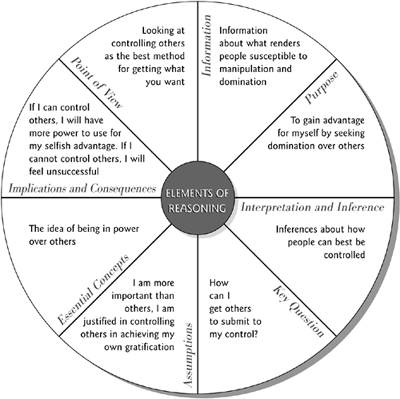Westside Toastmasters is located in Los Angeles and Santa Monica, California
Dominating Egocentrism
Between the two functions of egocentric thinking, perhaps the one more easily understood is the dominating function - or the dominating ego, as we usually will refer to it for the purposes of this chapter. When we are operating within this mode of thinking, we are concerned, first and foremost, to get others to do precisely what we want by means of power over them. Thus, the dominating ego uses physical force, verbal intimidation, coercion, violence, aggression, "authority," and any other form of overt power to achieve its agenda. It is driven by the fundamental belief that to get what we want, we must control others in such a way that were they to resist us, we could force them to do what we want. At times, of course, domination may be quite subtle and indirect, with a quiet voice and what appears to be a mild manner.
For examples of the dominating ego at work, we need only to look to the many people who are verbally or physically abused by their spouses, or the many children similarly abused by their parents. The basic unspoken pattern is, "If others don't do what I want, I force them to do it." Or consider the man in a bar who gets into a fight to force another man away from his girlfriend. His purpose, on the surface, is to protect her. In reality, his purpose may be to ensure that she won't be tempted into a romantic relationship with someone else, or embarrass him in front of his peers.
Domination over others typically generates feelings of power and self-importance (Figure 10.8). Through self-deception, it also commonly entails a high sense of self-righteousness. The dominator is typically arrogant. To the dominator, control over others seems to be right and proper. The dominator uses force and control "for the good" of the person being dominated. The key is that there is self-confirmation and self-gain in using power and forcing others to submit. One key is that others must undergo undeserved inconvenience, pain, suffering, or deprivation as a result.
Figure 10.8. The logic of the dominating ego.

Given these mutually supporting mental structures, it is difficult for those who successfully dominate others to recognize any problems in their own behavior or reasoning. Why change when, in your mind, you are doing what ought to be done? Hence, as long as the dominating ego is "successful," it experiences positive emotions. To the extent that it is "unsuccessful" - unable to control, dominate, or manipulate others - it experiences negative emotions.
When control is the goal, negative emotions frequently generated from the frustrated failure to control include anger, rage, wrath, rancor, hostility, antagonism, depression, and sadness. Consider the abusive husband who, for many years, is successfully able to control his wife. When she decides to leave him, he may go into a fit of rage and kill her, and perhaps even himself. As long as he thinks he is in control of her, he feels satisfied. But when he no longer can dominate her, his irrational anger may well lead him to the extreme of physical violence.
Examples of the kinds of thinking that dominating persons use in justifying their irrational controlling behavior are:
"I know more than you do."
"Since I know more than you, I have an obligation to take charge."
"If I have to use force to make things right, I should do so because I understand better what needs to be done."
"If I have more power than you do, it is because I am superior to you in skill and understanding."
"I have a right to take the lead. I understand the situation best."
"You are behaving stupidly. I cannot let you hurt yourself."
"I am an expert. Therefore, there is nothing you can teach me that I don't already know or need to know."
Given these subconscious beliefs and thoughts, it follows that people who operate primarily from the dominating ego would be likely to have difficulties in interpersonal relationships, especially when they come up against another dominating ego or against a strong rational person.
Another benchmark of the dominating ego is its propensity to impose higher standards on others than it imposes on itself. For example, it may require something near perfection in others while ignoring blatant flaws in itself. For a simple, everyday example, we can turn to what often happens in traffic jams. People frequently drive as if their "rights" were sacred ("No one should ever cut me off.") while they frequently cut off others ("I have to get into this lane - too bad if others have to wait."). In short, the dominating ego expects others to adhere to rules and regulations it has the "right" to thrust aside at will.
From an ethical point of view, those who seek control over others frequently violate the rights, and ignore the needs, of others. Selfishness and cruelty are common in these people. It is, of course, difficult to gain any ground by reasoning with people who are under the sway of their dominating ego, for they will use any number of intellectual dodges to avoid taking moral responsibility for their behavior.
Test the Idea |
In the next section, we lay out the logic of egocentric submissive thinking, thinking that seeks power and security through attachment to those who dominate and wield power. Again we are not assuming that everyone who has power has achieved it by dominating others. They may well have achieved it through rational means. With this caveat in mind, let us begin with a basic outline of the submissive ego.



